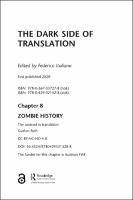The Dark Side of Translation
| dc.contributor.editor | Italiano, Federico | |
| dc.date.accessioned | 2021-05-18T02:03:41Z | |
| dc.date.available | 2021-05-18T02:03:41Z | |
| dc.date.issued | 2020 | |
| dc.date.submitted | 2021-05-17T07:56:26Z | |
| dc.identifier | https://library.oapen.org/handle/20.500.12657/48628 | |
| dc.identifier.uri | https://directory.doabooks.org/handle/20.500.12854/69707 | |
| dc.description.abstract | We tend to consider translation as something good, virtuous and bright, but it can also function as an instrument of concealment, silencing and misdirection—as something that darkens and obscures. Propaganda, misinformation, narratives of trauma and imagery of the enemy—to mention just a few of the negative phenomena that shape our lives—show patterns of communication in which translation either functions as a weapon or constitutes a space of conflict. But what does this dark side of translation look like? How does it work?Ground-breaking in its theoretical conception and pioneering in its thematic approach, this book unites international scholars from a range of disciplines including philosophy, translation studies, literary theory, ecocriticism, game studies, history and political science. With examples that illustrate complex theoretical and philosophical issues, this book also has a major focus on the translational dimension of ecology and climate change. Transdisciplinary and topical, this book is key reading for researchers, scholars and advanced students of translation studies, literature and related areas. | |
| dc.language | English | |
| dc.rights | open access | |
| dc.subject.classification | thema EDItEUR::C Language and Linguistics::CF Linguistics::CFP Translation and interpretation | en_US |
| dc.subject.classification | thema EDItEUR::C Language and Linguistics::CF Linguistics | en_US |
| dc.subject.other | The Dark Side of Translation,Holocaust and translation,Translating Political Anxieties,translator’s ambiguity,Uncanny Translation,Zombie History , Postcolonial translations, Climate and Knowledge, climate change discourses, Federico Italiano | |
| dc.title | The Dark Side of Translation | |
| dc.type | book | |
| oapen.relation.isPublishedBy | fa69b019-f4ee-4979-8d42-c6b6c476b5f0 | |
| oapen.relation.hasChapter | b5b0b744-fdba-4c13-8981-05bf417bcac2 | |
| oapen.relation.isbn | 9780367337278 | |
| oapen.relation.isbn | 9780429321528 | |
| oapen.relation.isbn | 9780367337285 | |
| oapen.imprint | Routledge | |
| oapen.review.comments | Taylor & Francis open access titles are reviewed as a minimum at proposal stage by at least two external peer reviewers and an internal editor (additional reviews may be sought and additional content reviewed as required). | |
| oapen.peerreview | Proposal review | |
| peerreview.review.type | Proposal | |
| peerreview.anonymity | Single-anonymised | |
| peerreview.reviewer.type | Internal editor | |
| peerreview.reviewer.type | External peer reviewer | |
| peerreview.review.stage | Pre-publication | |
| peerreview.open.review | No | |
| peerreview.publish.responsibility | Publisher | |
| peerreview.id | bc80075c-96cc-4740-a9f3-a234bc2598f1 | |
| peerreview.title | Proposal review |
Files in this item
| Files | Size | Format | View |
|---|---|---|---|
|
There are no files associated with this item. |
|||
This item appears in the following Collection(s)
Chapters in this book
-
(2020)We tend to consider translation as something good, virtuous and bright, but it can also function as an instrument of concealment, silencing and misdirection—as something that darkens and obscures. Propaganda, misinformation, ...

